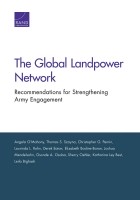| 来源类型 | Research Reports
|
| 规范类型 | 报告
|
| DOI | https://doi.org/10.7249/RR1813
|
| ISBN | 9780833097484
|
| 来源ID | RR-1813-A
|
| The Global Landpower Network: Recommendations for Strengthening Army Engagement |
| Angela O'Mahony; Thomas S. Szayna; Christopher G. Pernin; Laurinda L. Rohn; Derek Eaton; Elizabeth Bodine-Baron; Joshua Mendelsohn; Osonde A. Osoba; Sherry Oehler; Katharina Ley Best; et al.
|
| 发表日期 | 2017
|
| 出版年 | 2017
|
| 页码 | 152
|
| 语种 | 英语
|
| 结论 |
A GLN Can Benefit the Army- The Army's GLN is the existing and evolving network of partners, connected by a dynamic set of relationships formed through formal agreements, informal interactions, and shared infrastructure, with a common interest in developing and delivering land power–based options to further collective security objectives.
- It could lead to more-effective focusing of the Army's efforts in its engagement activities and partnerships.
- The institutionalization of the GLN concept will span the operating and generating forces, pulling training, intelligence, operations, policy, and other offices together under a general rubric.
- Army service component command personnel identified five benefits to deepening engagement: improved access and opportunities to work with and through partners, improved Army readiness, strengthened regional partnerships, engagement mind-set for working more effectively multilaterally, and opportunities to transform interpersonal relationships into institutional relationships.
Strengthening the Global Landpower Network Has Benefits and Challenges- They also identified five challenges to deepening engagement: having the right people, in the right place, at the right time; funding uncertainty; lack of accessible data on partner nations; difficulty in assessing success in engagements; and the operational headquarters structure.
- To address these challenges, the Army can change personnel and training systems and personnel selection and develop strong, persistent relationships with partners.
|
| 摘要 |
- Determine a champion for the GLN concept.
- Test and codify the value propositions of the GLN.
- Discuss the importance of engagement and demonstrate commitment to the GLN.
- Determine roles and responsibilities for the GLN concept.
- Integrate GLN into Army strategy, vision, and doctrine.
- Improve data collection and data access on engagement activities.
- Improve assessment of engagement activities.
- Develop a stronger culture of engagement.
- Realign and expand structures and programs to support the GLN.
- Expand the meaning of the engagement warfighting function.
- Expand and cultivate the pool of engagement personnel.
- Incentivize personnel to undertake partner engagement in line with the value of partner engagement for the Army.
- Develop and integrate network-centric planning procedures and visualization tools.
|
| 主题 | Security Cooperation
; United States Army
|
| URL | https://www.rand.org/pubs/research_reports/RR1813.html
|
| 来源智库 | RAND Corporation (United States)
|
| 引用统计 |
|
| 资源类型 | 智库出版物
|
| 条目标识符 | http://119.78.100.153/handle/2XGU8XDN/108544
|
推荐引用方式
GB/T 7714 |
Angela O'Mahony,Thomas S. Szayna,Christopher G. Pernin,et al. The Global Landpower Network: Recommendations for Strengthening Army Engagement. 2017.
|
|
文件名:
|
x1503321489068.jpg
|
|
格式:
|
JPEG
|

|
文件名:
|
RAND_RR1813.pdf
|
|
格式:
|
Adobe PDF
|
除非特别说明,本系统中所有内容都受版权保护,并保留所有权利。